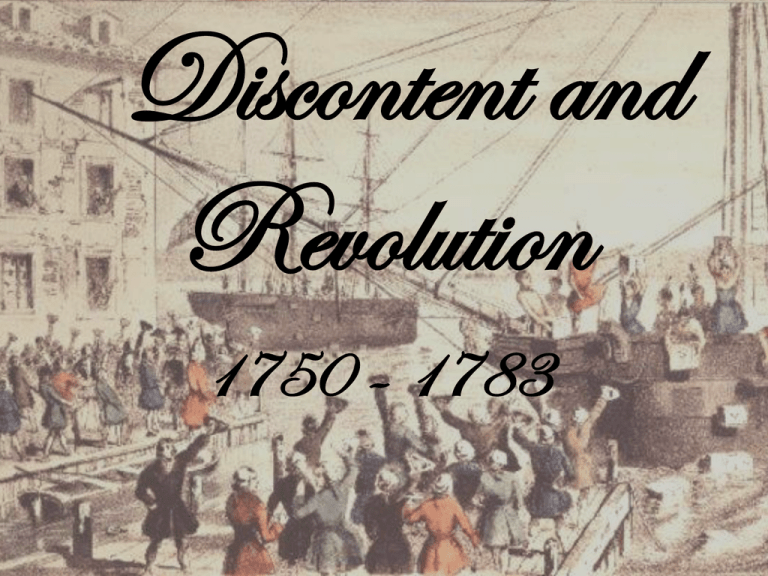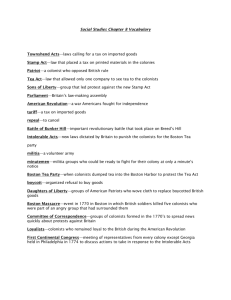Discontent and Revolution 1750 - 1783
advertisement

Discontent and Revolution 1750 - 1783 Today’s Lecture • Seven Years War (17561763) • Rising Tensions – The Stamp Act (1765) – “No Taxation Without Representation” – Religion – Townshend Duties • Revolutionary Women • Boston ‘Massacre’ (1770) – The Tea Act (1773) – Boston Tea Party • The Intolerable Acts (17741775) • The Road to Independence – Common Sense – The Declaration of Independence • Revolution! – – – – Saratoga The War Yorktown The Treaty of Paris Seven Years War • 1753: French settlers built forts in Ohio Valley • George Washington was sent to investigate by the Virginia Colony but was driven home by Native tribes • Six Nations Iroquois/ Albany Congress • General Braddock (British) dispatched with Regulars • Decimated by French/Indian troops in an ambush in 1755 (45% loss) Seven Years War • 1758: Iroquois and Ohio Indians abandoned the French cause • Newly elected Prime Minister William Pitt reinvigorated the Colonial Troops • Britain agreed to foot the bill • 1760: Montreal Surrenders • 1763: Treaty of Paris • End of French America Rising Tensions • Seven Years War created debt in both the Colonies and Britain • Taxes levied to help pay it off • 1760: Writs of Assistance • General search warrant for smuggled goods • Colonists considered it unconstitutional; ‘rights of Englishmen’ • “Limits beyond which, if Parliament goes, their Acts not bind” – James Otis Rising Tensions • The Sugar Act (1764) • Tax on imported goods changes to shipping administration • Resulted in higher prices and confiscated • Mostly affected Northern Colonies • Pontiac Rebellion/ Proclamation of 1763 • Restoration of lands to the French/ Defeat by British • Accused of putting Native needs ahead of Colonists’ wonts • Established a peacetime standing army The Stamp Act (1765) • British tax burden = 26 shillings pp/ Colonists = 1/1 ½ shillings pp • Stamp Act called for special ‘stamped’ or watermarked paper to be used for all official purposes (newspapers/ licenses etc.) • Internal tax which affected the American public • Projected to cover roughly 20% of American military expenses • Demonstrated Parliament’s indifference to the Colonies • Petitions in opposition prior to passage were not even heard in London • Largest protests heard in Boston • Suffered most from the Stamp Act • Pressured Stamp Distributors to resign before the tax was due • Andrew Oliver (Boston) • 1766 Repeal and Declaratory Act No Taxation Without Representation! • The Colonists were opposed to the new taxes • They already levied taxes through their Assemblies • Parliament could not tax British subjects who were not represented, but they claimed ‘virtual representation’ • Also claimed Assemblies counted as representation • Colonists argued that America was similar to Ireland: Self Governed, but answerable to the Crown • 1765: Virginia Assembly passed a Resolution against the Act; seven more Colonies followed suit by year’s end • ‘Sons of Liberty’ groups sprang up throughout the Colonies to protest the ‘unlawful’ taxation Religion • Clergymen discussed resistance to the British in their sermons and Town meetings • They were in a far better position to disseminate information • Few Americans had access to pamphlets or newspapers, especially in rural areas (those who did often couldn’t read) • Clergymen were trusted sources of information and influence • Believed that personal liberty was Godly, and the denial of such a sin • Lead by Congregationalist, Calvinist, Presbyterian and Baptist Clergy • Quakers were pacifist; Anglicans answerable to the King The Townshend Duties (1767-1770) • Actually called the Revenue Act, but named after British Chancellor of the Exchequer, Charles Townshend • A customs tax on glass, paint, lead, paper and tea; Constituted an ‘external’ tax, unlike the Stamp Act which was ‘internal’ • Control measure, not trade regulation or moneymaking measure • Intended to fund Governors salaries to free them from the control of the assemblies • Samuel Adams’ ‘Circular Letters’; An ‘incentive to rebellion’ – Lord Hillsborough. Overreaction • 1768: Nonimportation • “Save your money and you save your country” • 1770: Lord North repeals the Townshend Duties (Except the tea tax) Revolutionary Women • Enabled middle and upper class white women to play a part in politics • Forefront of the boycott • Denounced the consumption of tea • A more effective threat than nonimportation; homespun • Legitimacy: “women might recover to this country the full and free enjoyment of all our rights, properties and privileges… which is more than the men have been able to do” – Rev. John Cleveland • Demonstrated that resistance to British tyranny was widespread The Boston Massacre (1770) • British troops dispatched to Boston in 1768 • March 5th 1770: Crowds gathered outside the Boston Customs House to protest; Goaded the Redcoats • A Private fired indiscriminately into the crowd; 5 killed, several wounded • Crowd unarmed despite taunts • Soldiers responsible either acquitted, or branded. • Highlighted the tensions between Colonists and British The Tea Act (1773) • Non-consumption of tea brought the British East India Company to the brink of bankruptcy • British East India Co. vital to colonial rule in India • The Tea Act repealed all import duties on British East India Co. tea entering Britain; direct sale • Americans resolved to prevent the ships from docking • One ship docked however • 50 Bostonians dressed as Native Americans boarded the ship and threw the tea into the sea. The ‘Intolerable Acts’ (1774-1775) • The Boston ‘Tea Party’ inflamed Parliament • Response: The Coercive Acts 1) Boston Port Bill: Closure of Boston Harbor 2) Massachusetts Government Act: Revoked Massachusetts’ government charter and the Assembly’s right to vote in the Upper House 3) Administration of Justice Act: enabled royal officials to be tried in Britain rather than the Colonies 4) Quartering Act: Allowed the Governor to requisition empty buildings for billeting of troops • Quebec Act: established Roman Catholicism as Quebec’s official religion The Road to Independence • 1st Continental Congress (Sept. 5th 1774) • Called for the repeal of the Intolerable Acts and trade boycott • Prevented the British intention to isolate Boston • “We are deficient in genius, in education, in travel, in fortune, in everything” – John Adams • “Everyday we sit, the more we are convinced that the designs against us are hostile and sanguinary” – John Adams • “One if by land, two if by sea” (April 18th- 19th 1775) • Minutemen; Samuel Prescott’s Ride to Lexington and Concord Revolution! • Battle of Bunker Hill – Actually the battle of Breed’s Hill • Farmers vs. Soldiers – Leads to a favouring of guerrilla warfare tactics and localised skirmishes over full-scale battles • Slave Soldiers – Around 5,000 free and enslaved blacks fought for the rebels Common Sense • Published anonymously, 10th Jan. 1776 – Written by Englishman Thomas Paine • Immediate bestseller • Largest sale and circulation on any book in American history at the time • Focused on the importance of self-government • Anti-royalist sentiments – monarchy is sinful • Argued that British rule had run its course • British rule was no longer beneficial to American colonists • Britain was not a benevolent protector and therefore no longer deserving of American loyalty • Penned by Southern planter Thomas Jefferson – John Adams believed this would reduce MA-centricity • Noted 21 examples of Britain’s tyrannical rule – Taxation without representation; imposition of military rule; use of brute force • “We hold these truths to be self evident, that all men are created equal, that they are endowed by their creator with certain inalienable Rights, that among these are life, liberty and the pursuit of happiness” – Jefferson’s dilemma • Signed July 4th 1776 The Battle of Saratoga • October 1777 • New York State • Washington’s ‘American Army’s’ first significant victory – Forced the surrender of British General Burgoyne • Turning point in the war for independence • Boosted both morale at home and ‘the cause’ overseas The War of American Independence • The Battle of Saratoga spurred French interest – France formally recognised American independence after the victory – France no longer wanted to reclaim American territories for itself, but it also did not want Britain to have them – Spain and the Netherlands followed suit soon after – Victory! But the war continued anyway • Washington’s Smallpox vaccination campaign – Controversial, and as revolutionary as the War itself Yorktown • October 1781 • Virginia • Washington abandons New York – Surprises British troops stationed in Virginia – Trapped Lord Cornwallis in York Penninsula • Blockade from French Fleet prevented retreat or reinforcements • Cornwallis surrendered – Abandoned all American slave soldiers he had recruited by promising freedom The Treaty of Paris • The Treaty of Paris signed on 3rd September 1783 – Peace talks had begun in 1782 after the British defeat at Yorktown – Signers included Benjamin Franklin and John Adams – Ratified by the Continental Congress • Ended the Revolutionary War – Recognised US independence from Britain; established land borders In Sum… • “Without American courage and endurance, the conflict could easily have been lost, but without French support, the war would have dragged on indecisively for years” – Historian David Reynolds • Many states largely untouched • Major battlegrounds: NC, SC, NY, GA, not MA, VA, PA • Around 25,000 American casualties • 1/3 lost in battle; 2/3 lost to disease; loss would have been much higher without Washington’s smallpox campaign • 1/5 American colonists had remained loyal – most migrated to Canada or Britain • John Adams first US Ambassador to Britain – Met by George III as a friend Next week… The Young Republic




